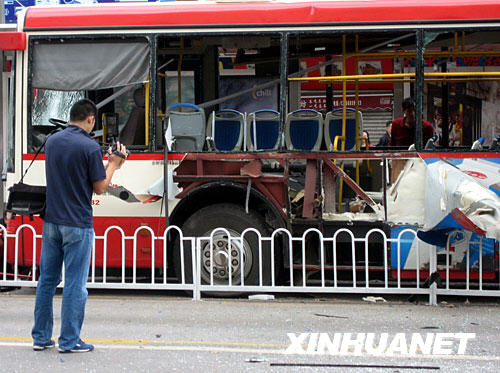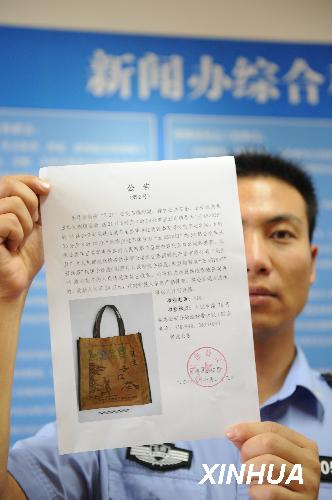 |
|
File photo
The explosions occurred on two Route 54 buses during the morning rush hour in Kunming, the Yunnan's provincial capital, on Monday, leaving two dead and 14 injured. |
Chinese authorities have denied claims by a Uygur separatist group that it took credit for a series of attacks in different Chinese cities, including deadly bus explosions in Kunming and Shanghai.
Two explosions occurred about an hour apart on two buses during the morning rush hour on Monday in Kunming, capital of southwestern Yunnan Province, leaving two dead and 14 injured.
"We have noticed media report about the claims, but so far, no evidence has been found to indicate the explosions were connected with terrorists and their attacks, or with the Beijing Olympics," a Yunnan Provincial Department of Public Security spokesman told Xinhua on Saturday.
"As to whether the explosions were masterminded by many suspects or just an individual, there is no conclusion now," he said. "The investigation is continuing."
 |
|
On Wednesday, the local security authorities in Kunming tripled the reward offer to 300,000 yuan (about 43,500 U.S. dollars) for information that could help to solve the two blasts. |
Local police have tripled the reward to 300,000 yuan (about 43,500 U.S. dollars) for information that could help to solve the two blasts.
Also Saturday, Shanghai police reiterated that the May 5 bus blast in the city had nothing to do with "terrorist attacks." Shanghai is a co-host city of next month's Olympics.
An investigation showed that the blast, which killed three people and injured 12, was caused by inflammables such as oil, said Cheng Jiulong, Shanghai Municipal Public Security Bureau deputy head.
"The blast was indeed deliberate but had nothing to do with terrorist attacks," he said.
Two of the dead were local female residents. Police have yet to confirm the identity of the male victim.
Cheng did not provide further details about the latest development of the case.
A group calling itself the Turkistan Islamic Party released a video threatening the Beijing Olympic Games, according to AFP and Reuters.
The group also claimed responsibility for several other attacks, including an attack on police in the eastern city of Wenzhou, Zhejiang Province, on July 17 with an explosive-laden tractor and the bombing of a plastics factory in the southern city of Guangzhou on the same day.
Kunming police scramble to find bus explosion clues
Five days after a pair of fatal bus explosions, police in Kunming, a city in southwest China's Yunnan Province, are struggling to find clues about the mysterious blasts.
The explosions occurred on two Route 54 buses during the morning rush hour in Kunming, the provincial capital, on Monday, leaving two dead and 14 injured.
One blast occurred at Panjiawan bus stop on West Renmin Road at 7:10 a.m., while the other took place at the intersection of Changyuan Road and West Renmin Road at 8:05 a.m. as the bus was about to reach its final stop at the Minshan area.
On Wednesday, the local security authorities in Kunming tripled the reward offer to 300,000 yuan (about 43,500 U.S. dollars) for information that could help to solve the two blasts.
No helpful information been proffered so far.
The manhunt for the perpetrator(s), however, is still ongoing.
Victims who were hospitalized for injury in the explosions were taken to the sites of the blasts on Friday by police hoping to jog their memory for useful information.
Among them was Han Xianming, the fiance of Wang Dezhi who was killed in the explosion at Panjiawan bus stop, according to a report posted on Eastday.com.
Han, also identified as Han Guangming in other news items run previously, said he and the others injured were led onto an empty bus parked in an open space at Minshan. They were told to be seated just as they were before the blast, trying hard to remember faces getting on and off the bus. Police officers were taking notes of what they said.
"Give me one yuan change, later on I can pay the fare easily" was the last words Han remembered Wang uttering before her death.
Wang sat in a seat opposite Han after getting on the bus. Han changed to another seat after its occupant got off. "The explosion went off within less than 10 seconds after I had sat down," Han recalled.
Before the blast, the couple were heading for Wang's home to celebrate the fifth birthday of her daughter from a previous marriage.
To nab the culprits quickly on the day of the blasts, some 300 police officers fanned out all along stops of the entire No. 54 service route. This included 100 officers positioned at the bus depot at Minshan and the Panjiawan bus stop, trying to find passengers who rode on the two ill-fated buses.
In addition, traffic police also tightened inspection over taxis as of Friday, alongside improved checks at the border and over transient people.
In a related development, police in Yangzhou, a scenic city in the eastern Jiangsu Province, on Thursday detained a man surnamed Wang. He was under suspicion of concocting and deliberately causing panic among the society by using the bus explosions in Kunming to spreading fake information.
The 23-year-old, a native of Jingshan in the central Hubei Province, had migrated to Yangzhou. He stayed with his parents peddling vegetables in the city upon completion of his senior high school education, according to Yangzhou City Security Bureau.
Shortly after the blasts in Kunming on Monday, Wang read about it and then posted a line under the name of "hostile forces" on an unidentified website. He claimed to be responsible for the two explosions and threatened to carry out more in future.
Wang confessed during a police interrogation that he made the acts with the purposes of getting more, stronger attention and worship from netizens.
(Xinhua News Agency July 26, 2008)